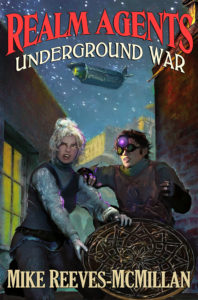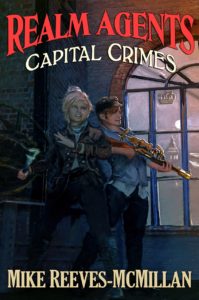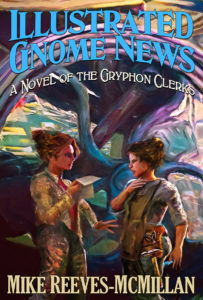With the publication of Book 5, Memorial Museum*, I’ve now completed my Auckland Allies series. I’m not promising anything one way or the other about a sequel series; all I’ll say is that, for now, the story is complete.
Time, then, to reflect back on what I enjoyed about writing it, the decisions I made, and what I’ve learned.
*Links to the books in this post are Amazon affiliate links.
From Plan to Execution
When I first started the Auckland Allies series, I wrote a post about urban fantasy worldbuilding reflecting on the choices I was making. I asked myself five questions, and the answers I chose shaped the series in, I think, satisfactory ways.
1. Out, or Maskerade?
In other words, do people in general know that magic exists, or not? I decided for this one that, initially at least, they did not, since that gave me a significant change I could make if I wanted to, whereas deciding that the existence of magic was publicly known from the start left me no room to go from there to a world where it wasn’t. (Barring memory modification on a massive scale.)
This was a good decision in several ways. Most notably, it led me to create the Guardians, a group whose entire mission was keeping the Secret of magic’s existence from the mundanes. This made them into secondary antagonists (particularly in the last book), as the Allies had to navigate around, or outright oppose, their agenda. To up the ante, I made the main representatives of the Guardians that the Allies encounter Australian, adding the sibling-like rivalry between New Zealand and Australia into the mix. And the Guardians formed part of the backstory of one of my main characters, Dan, who had trained to become one, but left disillusioned.
2. New, or Always There?
This decision was between magic that’s always been around versus magic that’s newly emerged through some apocalyptic event. I decided on “always been around,” in part because I wanted to introduce some elements of secret history and reference traditional magic systems like Goetia and Enochian. I always had the idea, though, that magic was not fully understood, that traditional magic was trial-and-error like traditional medicine, and that the application of science to magic would potentially enable my characters to gain an edge. This led to the invention of a secret manuscript by Sir Isaac Newton (who, historically, spent about as much effort on alchemy and speculative theology as he did on physics) that gave key clues to how magic worked, and with the addition of the character of Lynn, a mathematician and physicist, I had the edge I was looking for. My characters were always planned to be relatively low-powered, a metaphor of sorts for New Zealand itself, and in order to make it plausible that they kept winning against more powerful and better-resourced enemies, I had to give them an advantage through the application of ingenuity that their enemies (old-fashioned and blinkered in their thinking) couldn’t replicate.
This also, as I noted in my original post, enabled me to develop how magic worked in the course of the series, rather than be stuck with a static magic system, and to use previous failures or challenges as a stimulus to develop new solutions. I love a clever, innovative solution, and this approach gave me plenty of scope for them.
3. What Supernaturals Exist?
Rather than populate my books with more flavours of fae, vampires, shifters, undead and what not than Ben & Jerry’s has ice cream, I initially set out to just have human magic-users. I did note in my original post that I wanted to explore the idea of angels and demons, that I wanted to have a character–Dan, as it turned out–who had a particular theory about what they were (complex spells with an AI-like interface, rather than actual beings), which might or might not be correct. This enabled me to set up a situation in which several characters disagreed about how magic worked, which I think is realistic, and enabled me to explore the theme of working together even though you disagree.
I also noted that I wasn’t ruling out lycanthropes–who wouldn’t be shapeshifters; the transformation would be mental, because a physical transformation was more magic than I was planning on. I did, indeed, introduce such lycanthropes in Book 4, Wolf Park.
What I didn’t initially plan on was ghosts, which come into Book 2, Ghost Bridge. I put a bit of sciencebabble around what they were, but they’re basically what you think of when you think of ghosts (though Dan, fussy as always, insists that that’s a reductive way of looking at them).
4. Training or Genetics?
Whenever you put magic in your book, you need to think about (or, at least, I think you ought to think about) whether it is inherent or learned. The inherited ability to do magic creates a haves-and-have-nots scenario, as in Harry Potter, and an inherent elitism. This is a dynamic with a lot of potential for storytelling and conflict, so I went with it.
Genetics (at least, for anything complex) also tends to work on a power law, where a few people have a lot of the feature, a larger number of people have a little, and there’s a steep drop-off. I wanted to feature people on the lower part of the power curve, using their limited power creatively.
In the last couple of books, I did something to subvert the “magic is something you’re born with or without” setup, which I won’t go into in depth because it’s a spoiler. But I couldn’t have done that without creating the setup in the first place.
5. How Does Magic Work?
This is a question I continued to explore throughout the series, but I started out with “human minds mesh with something quantum [waves hands vaguely] and produce physical effects” and built from there. One of my main characters was an electromancer, who could use his very minimal level of power to move electrons and his training as an electronics engineer to make that extremely useful, in a fun alternative to the Dresden Files setup where magic and technology don’t play well together. I kept things mostly vague, meaning I could bring in new possibilities if they would be cool for the plot, but also kept the power low-level unless the characters were willing to pay a cost. At a couple of points, I have Steampunk Sally use her deep connection to the city to produce effects that she couldn’t produce alone (that’s her in giant illusory form on the cover of Unsafe Harbour).
I tried to make sure that the characters weren’t using magic to solve their problems; they were using intelligence and courage and teamwork to solve their problems, and that involved magical effects.
The Role of the City
I did mention, early in my planning post, that part of the reason I wanted to write an urban fantasy was that it would be enjoyably different to use real-world settings instead of ones I made up from scratch. What I didn’t anticipate was how much that would influence the story.
I’ve reflected elseblog on how the real-world locations gave me ideas for blocking and action that I wouldn’t have otherwise come up with. What I hadn’t anticipated, though, was how much of a celebration of Auckland the books would become, and how the story would unfold in a way that couldn’t have been done in any other city in the world.
The first book, Auckland Allies, kicked this off when the antagonists decided to anchor a magical summoning pentacle to five of the city’s extinct volcanoes. Not many world cities have 50 or so volcanic sites scattered about, so right there this was a distinctly Auckland story.
Book 2, Ghost Bridge, is even more so. The bridge of the title, Grafton Bridge, is a city landmark, but the important part is that it has the hospital near one end, a luxury hotel at the other, and a cemetery right next to (and in fact partly under) it. There’s also a statue of Zealandia, the personified spirit of New Zealand, nearby. The cemetery includes a mass grave, right next to the bridge, for Catholics whose original graves were removed as part of putting through a motorway in the 1960s, and buses run regularly on a loop that includes the bridge. All of these real-world facts play into the story, which wouldn’t be possible without them.
Book 3, Unsafe Harbour, celebrates the beautiful Auckland Harbour; it could have worked in other harbour cities, I suppose, but the details would have been different. Likewise, Book 4, Wolf Park, features several iconic locations which would have broad parallels in other cities, but the exact details are distinctively Auckland. Book 5, Memorial Museum, pulls it all together and incidentally celebrates the city’s excellent museum.
Jim Butcher famously set the Dresden Files in Chicago because there was already an urban fantasy series set in the other city he was considering (Cleveland, from memory), not because he had any connection to Chicago at all. He didn’t even visit it until he was well into writing the series, and notoriously gets some details wrong. I wanted to use Auckland in a much more intentional way.
People sometimes talk about cities almost being characters in fantasy novels, and I did that very nearly literally at one point, with Sally embodying Auckland in the form of Zealandia. Even apart from that, though, Auckland as a setting is definitely front and centre in the series.
What I Learned
First of all, I learned that I really enjoy writing fiction set in the city where I’ve lived all my life, and featuring people who share my culture. I sometimes roll my eyes a bit at people who get all overly excited about books that, while lacking in important features like plot, characterization, storytelling, and basic writing mechanics, are full of “representation”. But reflecting on my experience of writing Auckland Allies, I think I get a hint of why they’re excited (though I still think they’re too excited, and that the books are lacking in those other ways).
I learned that using a pre-existing setting, rather than building one from scratch, can add to a story in ways that are unpredictable, because it’s an externally imposed constraint. Constraints make good art. Not that I’m going to stop making up settings from scratch, but I might consider using more pre-existing things as inspiration that I have to work around. I also learned quite a bit about my city and its history (and other bits of history, too) in the course of researching for the books.
I learned that I love making overt pop-culture references and jokes, something else I miss when writing in a secondary world. Sparx the electromancer was my main vehicle for these, though Sally and Lynn also contributed. I made sure that Sparx’s fell a bit flat sometimes with the other characters, as part of his characterization.
I learned a few things about working with an ensemble cast, too, which I plan to share in a separate post.
What’s Next?
As I said at the start of this post, I’m not going to promise anything about what’s next. I’m notoriously bad at following through on such plans, for one thing. Also, like many writers since the start of the pandemic, I’m feeling stuck, not sure how to write anymore now that global events have knocked our mental model of the world spinning off its axis.
During the same period, I’ve had several family events that discombobulated me further. I feel like I need to write something tremendously fun, as relief from the existential angst we’re all feeling, or else tremendously important, but I don’t know how to start on either one. The projects I’ve tried to start all feel a bit flat.
The good news is that I did have tremendous fun finishing the Auckland Allies series, and I think you’ll have fun reading it. The last two books are, I feel, among my best work. Whatever comes next, I’m happy with that.



 Finally, after epic delays,
Finally, after epic delays,